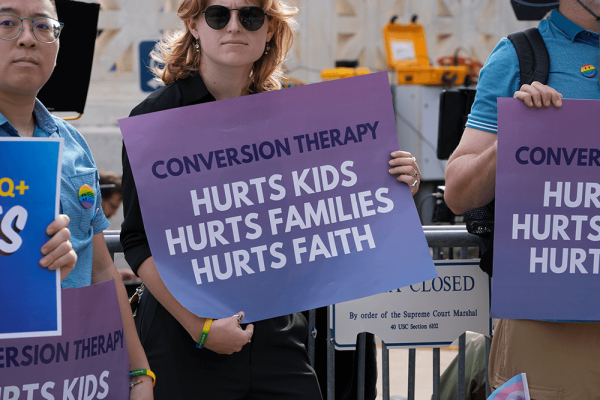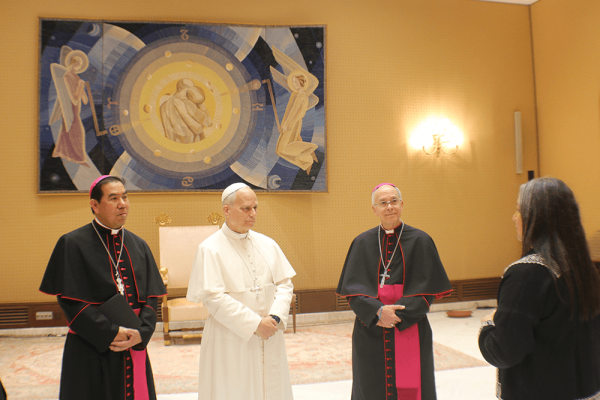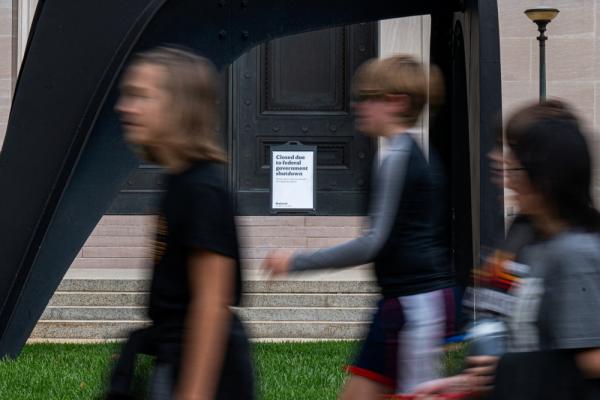In Palestine, we welcomed the news of a ceasefire with hope—a fragile, trembling hope. After months of unbearable horror, we allowed ourselves to exhale. For the people of Gaza, it meant a pause in the killing, a night of uneasy quiet, and the possibility of sleep without bombs.
In a climactic moment of the crime-comedy Roofman, Jeffrey Manchester (Channing Tatum) enters a Presbyterian church. It’s a moment of respite, both for him and the audience. Until then, the Army veteran had been a man on the run: After robbing more than 40 McDonald’s to support his family, police unceremoniously arrested Jeffrey at his daughter’s birthday party. Though sentenced to 45 years in prison, he escapes and camps out in a hollow wall behind a bicycle display in a Toys R Us (Here is where I’ll mention that the film is based on a true story).
Pretty quickly, Jeffrey’s refuge becomes isolating. What good is a store full of toys if you have nobody to play with? While it would be risky to enter a public space, the desperation for connection drives Jeffrey to the pews.
As I write, the federal government remains shut down, and with it, the Smithsonian and its numerous museums.
I suspect, however, that many in the executive branch aren’t losing sleep over a lack of access to publicly funded, rich, beautiful histories ranging from natural sciences to African American history. In the past year, the Trump administration has demanded those museums shape their presentation to his preferences, cut funding to these institutions, and lambasted the Smithsonian’s National Museum of African American History and Culture in particular.
Amid these attacks on a truthful telling of history, I spoke to Harry Singleton III, the faith-based director of the International African American Museum, to understand how a liberation theologian approaches the task of museum work. Singleton is the son of a Baptist minister; a native of South Carolina, where the museum is located; and a scholar who spent most of his time in academia before transitioning to the museum in June.
In the past week, the Trump administration brokered a deal that secured the release of Israeli hostages and Palestinian prisoners. While the terms of the long overdue ceasefire are being contested, this is a groundbreaking accomplishment for which I’m deeply thankful. But this short-term peacemaking victory abroad was quickly undermined by the administration’s bellicose rhetoric and actions at home.
President Donald Trump has repeatedly abused his ability to declare emergencies and seize power under the pretense of maintaining law and order. For example, he declared immigration emergencies to further militarize the U.S.-Mexico border and label drug cartels terrorists; he declared a “trade emergency” to justify and impose costly tariffs; and he declared an energy emergency to greenlight new drilling projects and ignore regulations. Most alarmingly, he has falsely declared a “crime” emergency to federalize and deploy National Guard troops to additional cities.
The Supreme Court seems likely to overrule a law banning conversion therapy for minors, horrifying queer faith leaders and their allies after years of fighting to protect queer children.
Colorado’s minor conversion therapy law prohibits state-licensed mental health workers from seeking to change a minor's sexual orientation or gender identity, including attempts to reduce or eliminate same-sex attraction or change “behaviors or gender expressions.” Violations are punishable by a fine of up to $5,000. The petitioner Kaley Chiles is a Christian counselor who argues that the law violates her First Amendment right to free speech by censoring what can be discussed with consent in therapy sessions.
Chris Damian, a gay Catholic lawyer, told Sojourners that the case hinges on whether talk therapy is considered a form of speech or whether it’s considered conduct.
“Obviously this case is about conversion therapy,” Damian said. “But it’s also about much more. It’s about whether and how state legislatures can hold mental health professionals accountable for their practice.”
Are billionaires the reason we can’t have nice things? It’s tempting to think so.
Consider Elon Musk, having been messily ejected from President Donald Trump’s orbit after his DOGE project ended in failure, with little to show for it other than an appalling and growing body count. Or Jeff Bezos, whose reported interference with The Washington Post has helped reduce the one-time standard bearer of ferocious journalism to a husk of its former glory.
As President Donald Trump ordered federal troops into Chicago to assist with deportation efforts, immigrants and their advocates found an ally in Pope Leo XIV. A native of the city, the new pope urged U.S. bishops to confront the government’s escalating targeting of migrants.
After a private audience with Catholic leaders from El Paso, Texas, at the Vatican, on Oct. 8, Leo said he would like the U.S. Conference of Catholic Bishops to issue a formal statement. His appeal followed recent comments questioning the consistency of some American Catholics’ moral stances: “Someone who says that ‘I’m against abortion, but I’m in agreement with the inhuman treatment of immigrants in the United States,’ I don’t know if that’s pro-life.”
Alongside Bishop of El Paso Mark J. Seitz, Hope Border Institute, a grassroots organization rooted in Catholic social teaching, presented the pope with a stack of letters from immigrant community members. The letters expressed both the worries and hopes of migrants in today’s political climate and were received with emotion, said Astrid Liden, Hope’s communications officer.
Joyous Palestinians rushed to embrace prisoners freed under a U.S.-brokered ceasefire agreement as they arrived by bus to the occupied West Bank and Gaza on Monday.
The prisoners were released after the Hamas militant group freed the last 20 living hostages taken during the Oct. 7, 2023, attacks that precipitated the war in Gaza.
Under the deal, Israel is set to release 250 Palestinians convicted of murder and other serious crimes as well as 1,700 Palestinians detained in Gaza since the war began, 22 Palestinian minors, and the bodies of 360 militants.
Several thousand people gathered inside and around the Nasser Hospital in Khan Younis in the southern Gaza Strip, awaiting the arrival of freed prisoners, with some waving Palestinian flags and others holding pictures of their relatives.
Fighting back tears, one woman who asked to be identified as Um Ahmed said she said that despite her joy at the release, she still had “mixed feelings” about the day.
As we enter the second week of the government shutdown, paychecks are on hold, flights are being delayed, and the political blame game is in full swing. One way or another, it will end when legislators do what they failed to do in the first place: Pass a spending bill.
Until that happens, I find it’s easy to get lost in the political soup of it all. A nonstop churn of pundits bid for the best take on what the shutdown means, which party will be held responsible, and whether a new spending bill even matters if Congress won’t do its job and enforce. Politicians point fingers, the president posts a racist deepfake, and Washington, D.C.’s bars roll out themed “unhappy hour” menus with discounts for furloughed workers. A round of “Continuing Rye-solutions,” anyone?








